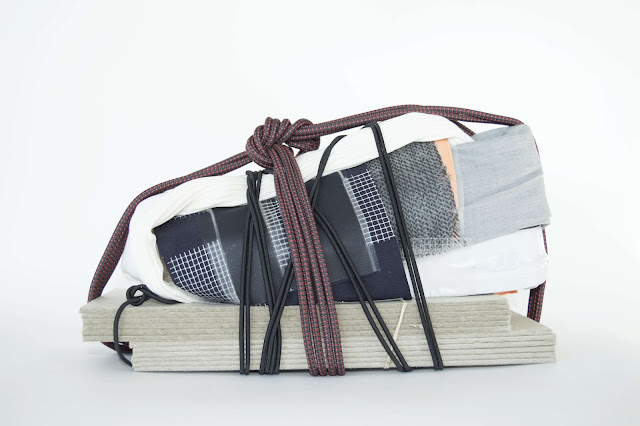Glitter, flies, pigeons and doughnuts, Priya's textiles feature trash and its accompanying fauna in a pop art approach to textiles and applique. Priya has just graduated from Bournemouth University.
Thursday, 29 June 2017
Wednesday, 28 June 2017
Hannah Middleton
Hannah Middleton has just graduated in Textiles from Cardiff Metropolitan University. The focus of her graduate collection was the shore line and the creature found there. I love the unusual barnacles and mermaids purses, but also her drawings in stitch that keep the energy and power of her original sketches.
Saturday, 24 June 2017
Wednesday, 21 June 2017
Ibukun Jesusanmi I
Ibukun Jesusanmi has just graduated in textiles from Manchester School of Art. Her work is full of
character and fun and has a great energy of dynamic mark making and texture, incorporating beading, fur applique and hand embroidery. Thank you
Tuesday, 20 June 2017
Kate Connell
Kate Connell's textiles were bold prints on modern fabrics. I loved her shoe concepts and vibrant energetic fashion illustrations. Kate has graduated with a BA Hons from Glasgow School of Art.
Monday, 19 June 2017
Natascia Forte
Natascia Forte has just graduated with a BA in Textiles from Glasgow School of Art with effervescent tufts of knit contrasting with flatter weaves in exciting contrasts of texture, visual dynamics, and colour.
Thursday, 15 June 2017
Sgàire Wood
Exploring the identity of 'Ceticity' and it's identity in dress, Sgaire Wood's collection 'Sidhe' is a response to the confused and fragmented identity of the Celt in post colonial society, examining the commodification of authenticity and fetishisation of the traditional rural life of Celts in Ireland and Scotland.
Wednesday, 14 June 2017
Liga Boyd I
Many moons ago Liga Boyd was one of my fashion students and so I am very proud this year to see her graduating in womanswear from Edinburgh College of Art.
"The focus of my collection was modern societies obsession about body and image proliferated through social media. I took a surrealist approach to my designs by distorting the silhouette and creating my own fabrics such as macrame and knit in a new way. the metalic sparkle through the fabrics is to represent mirrors and camera flashes." Liga Boyd
Tuesday, 13 June 2017
Irene D'Antonio
Wednesday, 7 June 2017
Macbeth
I have been making more whirling dervish skirts, for the first time since working with NC students, this time for an adaptation of Macbeth by director Tina West, and her wonderful students, from Fife College. This adaptation is a contemporary and evocative piece of theatre, which echos internal and external conflict that we see around us in the contemporary political environment, it is a site specific piece that uses audio and powerful physical theatre . The skirts had to be adaptable, reversible and able to be split apart so that they can be used as scenery.
This performance is taking place in Dunfermline Abbey all week with special school performances.
Monica Dritschel
Monica Dritschel has engineered bread into a dress, fashioning a complete and complex garment with incredible attention to detail and texture.
"The aim of my work is to skew the role of food. I transform its function from an essential substance ingested to sustain life into an object which envelopes the body. A fundamental food staple is a bread. It has symbolic significance in religion and literature; it engages our visual, tactile and olfactory senses. I use ordinary white sliced bread to create a garment, thereby communicating the complex issues surround the effect of food on one’s body. By, transforming an everyday staple into a fur-like coat disrupts one’s common preconceptions of what one commonly consumes. To warp the function of food. Instead of being viewed essential for life food now becomes a material which envelopes the body. Bread is used to create a garment that establishes a new relationship between the internal and external self. Perceiving dough as a 'clay' expands the boundaries between cooking and contemporary art. The manipulation of this material into a fur-like surface causes disruption of common preconceptions, making one deeply reflect on the role of this common staple." Monica Dritschel
Subscribe to:
Posts (Atom)



















































